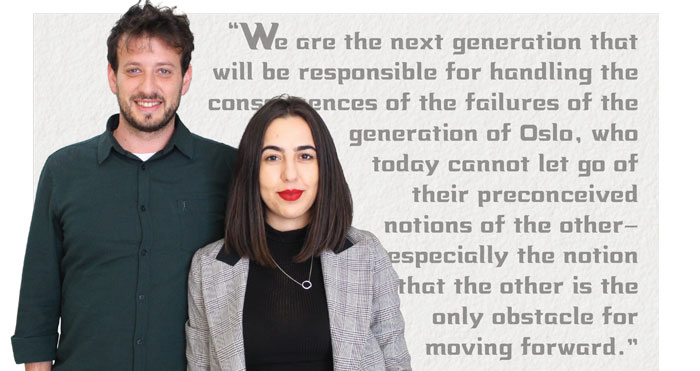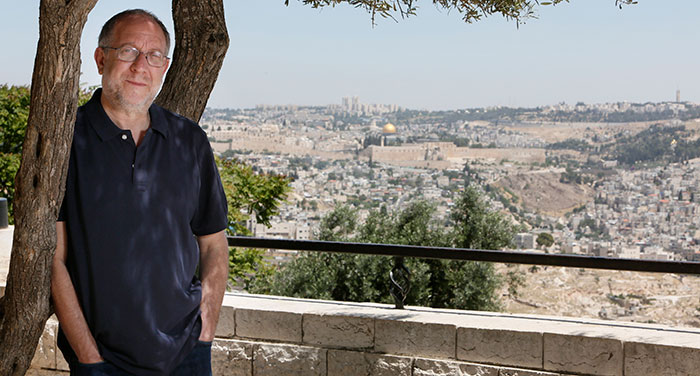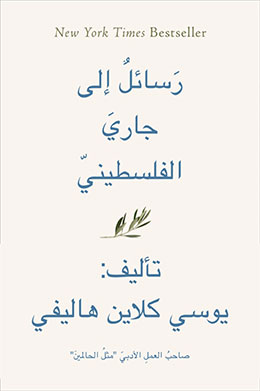Israeli Scene
Feature
Journey Into a Changing Middle East
Two years ago, I published a book called Letters to My Palestinian Neighbor
, an attempt to explain to Palestinians and others in the Middle East who the Jews are and why we returned home. No Israeli writer had ever turned directly to our neighbors to confront the misperceptions and distortions widespread in the Arab world about Jewish history and identity, our ancient connection to the land and our modern right to sovereignty. The culture of denial that rejects Jewish indigenousness is, I believe, the main reason why a solution continues to elude us. And so I decided to challenge that conceptual obstacle to peace.
The book was translated into Arabic and offered as a free download—the same day that Letters first appeared in English. That was the most obvious precondition for fulfilling the book’s intention. I pledged to respond to any letter written in a spirit of engagement. My goal was modest: to find even a few Palestinians with whom to model a respectful disagreement over irreconcilable narratives. Palestinians and Israelis will never agree on what happened and why in 1948 or 1967, or which side is guilty for the collapse of the Oslo peace process of the 1990s. Instead, the conversation I hoped to model would be based on the premise that two indigenous peoples share this land and the right to self-determination.
I tried to suppress expectations. This is, after all, a time of growing despair among both Israelis and Palestinians. The vehement Palestinian rejection of the “Trump Plan” unveiled earlier this year, a plan that would award the Palestinians a state but smaller than in previous plans and keep all settlements in place, only confirmed just how far we are from an agreement.

And yet the hundreds of responses I’ve gotten—from Palestinians and others in the region—hint at potentially historic changes in attitudes toward Israel. The responses, mostly via Facebook and the Arabic website I created for the book, have been compelling enough to warrant a new edition of the book, published in June 2019, which now includes a 50-page epilogue titled, “Letters From Palestinians to Their Israeli Neighbor.”
The Online Hadassah Magazine Discussion Group presents “What’s Next for Israel? A Conversation with Yossi Klein Halevi.” On May 21 at 12 p.m., join Executive Editor Lisa Hostein in a candid conversation with the ‘New York Times’ best-selling author of ‘Letters to My Palestinian Neighbor.’ Klein Halevi, a widely respected analyst, will address the rapid changes happening in the Middle East that are a cause for cautious optimism about the future. Register here.
“We both have legitimate claims,” wrote a Palestinian young man who grew up in a West Bank refugee camp. A young woman from Gaza commented, “I’m reading your book because I hope it will give me hope.”
Many expressed hatred for Israel and denied the historicity of our connection to the land—and of the Holocaust. “I recognize that massacre,” wrote Saleh of Ramallah, “but at the same time I have read a lot of books and reports and heard Jewish witnesses who claim that it was technically impossible to kill all those people, which causes me to think that there is an exaggeration.”
Others expressed gratitude for my effort at outreach. One day, a young Palestinian man whom I’ll call Ali appeared in my office at the Shalom Hartman Institute in Jerusalem. Ali told me that he’d read the book in both Arabic and English, and that the Arabic translation was of poor quality, lacking literary grace. He handed me some pages in Arabic and said, “This is my translation. If you think it’s good, I’ll be happy to re-translate the book.”
I showed Ali’s translation to several Arabic speakers and the response was enthusiastic. I hired Ali and he produced the Arabic translation that now appears at letterstomyneighbor.com. Tellingly, Ali, concerned about reprisals from fellow Palestinians, asked to publish the book without his byline as translator.
Ali is now managing the book’s social media outreach in Arabic. Thanks to his work, I’ve received responses from across the Middle East. The London-based and Saudi-owned Majalla, a popular online news weekly in Saudi Arabia, gave the book a highly positive two-page review. Other favorable reviews have appeared in the Moroccan media and on Egyptian blogs. A Saudi sheikh (who, like many respondents, prefers anonymity) wrote saying that he hadn’t known that the Jews are descendants of the Hebrews. He now realized that Israel had ancient roots in the region and so of course was a legitimate part of the Middle East. A Syrian refugee named Rawan wrote that she had been raised to hate Israel and that my book had helped her understand the Jewish attachment to the land.

What accounts for these positive responses? Partly it is fear of an expansionist Shiite Iran, which has led to an unprecedented strategic alliance between Israel and Saudi Arabia and other Sunni states.
But there are deeper reasons, too. Growing voices in the region are saying that the Arab world’s obsession with Israel has created a poisoned culture of hatred and paranoia that contributed to the self-destruction of their societies, from Syria to Libya.
Last November, three dozen prominent figures from throughout the Arab world—including an Egyptian member of parliament, a former Kuwaiti minister, journalists from Tunisia and the Gulf States and a Shiite cleric from Lebanon—gathered in London to found the Arab Council for Regional Integration, calling for an end to the anti-Israel boycott. For the first time in the history of the Arab-Israeli conflict, a grassroots pan-Arab movement is urging normalization with Israel.

Wary of being manipulated, the group has insisted on its independence, avoiding any government sponsorship, whether from the Arab world or from the West. No Israelis were present at the November gathering. Many participants come from countries where just meeting with Israelis can land you in prison for “normalizing” relations with the enemy. As expected, the group faced devastating criticism in Arab social media—but also vocal support. The Iranian regime and its Hezbollah proxy condemned the council’s members as traitors, but Arab governments have been intriguingly silent.
For many years I, like most Israelis, was a peace skeptic. The traumatic experience of the Second Intifada, the four-year wave of suicide bombings that broke out in 2000 after Israel had agreed to a two-state solution, convinced me that the Palestinian national movement, and the Arab world generally, had not yet come to terms with Israel’s right to exist.
But changes in the region, along with my own recent experiences, have challenged that skepticism. Not that peace will happen anytime soon: We are more likely to find ourselves on the battlefield—against Hamas or Hezbollah or even Iran—than at the negotiating table. And Palestinian public discourse still forbids any acknowledgment of Israel’s legitimacy. According to a recent poll of the Palestinian Center for Policy and Survey Research, two-thirds of Palestinians support armed struggle against Israel and only 39 percent back a two-state solution.
But for the first time after many years, I am allowing myself to cautiously hope again.
The new edition of my book concludes with a joint letter written by two friends—a young Palestinian-American named Rawan Odeh and a young Israeli named Bar Galin who first met at a coexistence seminar in Washington, D.C. “As a result of your book, we decided to travel to campuses across the United States and tell our very different stories alongside one another to students,” they wrote. “The book brought us together to create a serious dialogue between Palestinians and Israelis in their 20s. We are the next generation that will be responsible for handling the consequences of the failures of the generation of Oslo, who today cannot let go of their preconceived notions of the other—especially the notion that the other is the only obstacle for moving forward.”
When I find myself slipping back into despair, I remind myself of Rawan and Bar.
Yossi Klein Halevi is a senior fellow of the Shalom Hartman Institute in Jerusalem. His 2013 book, ‘Like Dreamers,’ won the Jewish Book Council’s Everett Book of the Year Award. His ‘Letters to My Palestinian Neighbor’ is a New York Times best seller.
The Online Hadassah Magazine Discussion Group presents “What’s Next for Israel? A Conversation with Yossi Klein Halevi.” On May 21 at 12 p.m., join Executive Editor Lisa Hostein in a candid conversation with New York Times best-selling author of Letters to My Palestinian Neighbor. Klein Halevi, a widely respected analyst, will address the rapid changes happening in the Middle East that are a cause for cautious optimism about the future. Register here.











 Facebook
Facebook Instagram
Instagram Twitter
Twitter
[…] Journey Into a Changing Middle East Last November, three dozen prominent figures from throughout the Arab world—including an Egyptian member of parliament, a former Kuwaiti minister, journalists from Tunisia and the Gulf States and a Shiite cleric from Lebanon—gathered in London to found the Arab Council for Regional Integration, calling for an end to the anti-Israel boycott. For the first time in the history of the Arab-Israeli conflict, a grassroots pan-Arab movement is urging normalization with Israel. […]